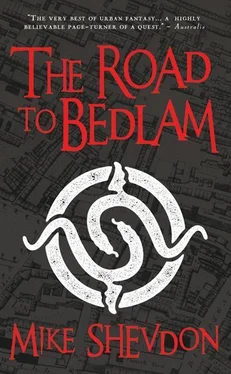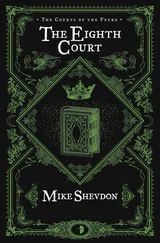Mike Shevdon - The Road to Bedlam
Здесь есть возможность читать онлайн «Mike Shevdon - The Road to Bedlam» весь текст электронной книги совершенно бесплатно (целиком полную версию без сокращений). В некоторых случаях можно слушать аудио, скачать через торрент в формате fb2 и присутствует краткое содержание. Жанр: Фэнтези, на английском языке. Описание произведения, (предисловие) а так же отзывы посетителей доступны на портале библиотеки ЛибКат.
- Название:The Road to Bedlam
- Автор:
- Жанр:
- Год:неизвестен
- ISBN:нет данных
- Рейтинг книги:5 / 5. Голосов: 1
-
Избранное:Добавить в избранное
- Отзывы:
-
Ваша оценка:
- 100
- 1
- 2
- 3
- 4
- 5
The Road to Bedlam: краткое содержание, описание и аннотация
Предлагаем к чтению аннотацию, описание, краткое содержание или предисловие (зависит от того, что написал сам автор книги «The Road to Bedlam»). Если вы не нашли необходимую информацию о книге — напишите в комментариях, мы постараемся отыскать её.
The Road to Bedlam — читать онлайн бесплатно полную книгу (весь текст) целиком
Ниже представлен текст книги, разбитый по страницам. Система сохранения места последней прочитанной страницы, позволяет с удобством читать онлайн бесплатно книгу «The Road to Bedlam», без необходимости каждый раз заново искать на чём Вы остановились. Поставьте закладку, и сможете в любой момент перейти на страницу, на которой закончили чтение.
Интервал:
Закладка:
I had already passed two lamp posts when I noticed the posters. I stopped and stared at the photocopied image taped to the metal, a thin plastic sheet stretched over to keep the rain off. The image of a girl's smiling face stared back at me. She looked happy, celebrating perhaps. The word MISSING was in bold lettering across the top, the question in large letters underneath – HAVE YOU SEEN THIS GIRL? I stared at it. Is that what I should be doing? Should I be pasting pictures of Alex on lamp posts, hoping against hope that she would be spotted somewhere?
I carried on down the hill, passing more images. Then I stopped and walked back up the hill. Examining the poster again, I carefully peeled away the tape and drew it out from behind the plastic. Then I took it down to the next lamp post and compared the images. They were different girls. One was named Gillian Mayhew, the other Debbie Vaughan. The photographs stared back at me. The posters shared the same format, the same typeface, the same words, but the girls were different.
They wouldn't be from the same family since they had different names, though that wasn't always the case in these days of divorce and separation, but these were very different girls. Gillian Mayhew had dark hair, slightly frizzy, and Mediterranean looks. She could be Italian, whereas Debbie Vaughan was blonde with a round face and full lips. The girls looked different but the posters looked the same. I carefully removed the second poster too. Tate and Garvin had both said that this mission was right up my street. Is this what they meant? Two young women missing from the same town at the same time was tragic for the families concerned, but it wouldn't justify the Warders becoming involved, surely? I tucked the posters into my bag and carried on walking. Gillian and Debbie alternately stared back at me from each successive lamp post all the way down the hill. Someone had been busy.
The main street was still opening up when I arrived. Window cleaners worked their way along the rows of shops while shutters were raised and awnings wound out. I walked all the way along and then discovered another street ran in parallel, so I completed the circuit and walked back along that. There were the usual chainstores mixed in with local traders; a butcher and a baker but no candlestick maker. There was a fishmonger advertising frozen fish, which seemed a bit pointed in a town with a fishing harbour two minutes' walk from where it stood.
I walked out to the harbour front. The walls fell sheer to oily water smelling of rotting seaweed and diesel. The harbour was full. The boats looked well used, the seawater peeling the paint and rusting the steel. Men stood around talking. No one was interested in taking the boats out fishing, though. There wasn't even anyone mending nets. Maybe it was a holiday?
I scanned the frontage around the harbour. A couple of ramshackle hotels offered the possibility of a bed for the night, the signs advertising rooms available. Like the boats, the paint was peeling and the windows were smeared. It didn't make for an inviting prospect and I wondered who stayed there. Not a spot for tourists.
Among the bait shops and estate agents was the Harbour Cafe, tables placed out in the sun to attract passing business. I crossed the road and wandered past. It was clean enough and the smell of frying bacon set my mouth watering. I went in and approached the counter. A middle-aged woman with pink streaks in her hair looked up. She acknowledged my presence with a stream of words I didn't recognise and couldn't decipher. The accent was thick.
"Sorry?"
She looked me up and down then spoke slowly and precisely for the terminally stupid. "Sit down, luv, and I'll come over and take your order."
"Thanks."
The other two patrons sat together, old men with jackets buttoned against the morning chill even though it was warm inside the cafe. I found a table next to the window where I could watch the comings and goings along the harbour. It was a good position. Garvin would have approved.
"Tea, luv, or coffee?" Appearing beside me, she spoke more naturally but moderated her accent for the obvious visitor.
"I'd like coffee, please, and a bacon sandwich."
"It'll be five minutes."
She left me watching the traffic. I took the posters out of my bag and laid them on the table in front of me, wondering whether they were the reason I was here. The girls smiled in the photos. I wondered whether they were still smiling.
"Bunkers, aren't they?" The woman had returned with a large mug of steaming black coffee and a glass sugar dispenser.
"Why are they bonkers?"
"Not bonkers, bunkers. They've bunked off, hamp't they?"
"Have they?"
"Not the only ones, either." She folded her arms, confirming her deduction.
"What do you mean?"
She went back to the counter and returned with a newspaper, which she laid on the table in front of me.
The headline was plain – FIFTH GIRL MISSING. A photo of a young woman was under the headline and four others were below it, two of which I recognised.
"Five?"
"All bunked off if you ask me. There's nothing for 'em here, is there?"
"No?"
"Not if you don't want to spend your days in yon call centre. More like one of them sweatshops if you ask me."
"That would be the new building on the hill, I take it."
"Monstrosity, it is. They work for nowt up there, not that it's any better down here. I'll go and get your sandwich." She bustled away.
It was a local paper. The missing girls were the lead story, bracketed by a planning dispute about a road diversion and threatened job losses at the call centre. A sweatshop they might be but they were clearly a major local employer.
The story about the girls was rich in speculation and short on facts. It implied that there was something untoward happening without actually saying what it was. One family was quoted as saying that their daughter had disappeared suddenly and unexpectedly. Another said that their eldest daughter had been doing well at college and asked why she would leave all her friends. The article called the disappearances spooky, but neglected to say why. The local police were noted as being aware of the situation but unwilling to investigate further.
My bacon sandwich turned up. The woman nodded towards the paper. "It's a lot of flannel, that. Don't believe a word." She paused as if she expected me to make some comment.
I thanked her for the sandwich. She turned and left me to eat it.
Leafing through the paper, I ate my breakfast, then read it through a second time while I sipped the scalding coffee. There were no other stories about the girls, but in the middle there was space for local advertising and promotions. There were two ads there that repeated the information from the posters I had taken down. The same two girls stared back at me.
On the events page there was an announcement from St Andrew's Church saying that a vigil was being held for the missing girls. People were invited to show their support for the families by attending the service and lighting candles. There was a contact number for the vicar, Gregory Makepeace. I copied the number down on to a napkin.
When the lady came to clear the plate, I handed back the paper. "I'm going to be in town for a few days, is there anywhere you could recommend for a place to stay?"
"Salesman, are ya? There's nobody buying round here, I can tell you that fer free."
"I'm not selling anything. Is there anywhere?"
She looked me over again, whether to discern my occupation or to discover if I was a suitable guest, I didn't know.
"You could ask at the Dolphin Guest House at the harbour end of Dorvey Street. Tell Martha that Geraldine at the cafe sent you. She'll sort you out."
I thanked her and paid, wondering what sorting me out meant.
Читать дальшеИнтервал:
Закладка:
Похожие книги на «The Road to Bedlam»
Представляем Вашему вниманию похожие книги на «The Road to Bedlam» списком для выбора. Мы отобрали схожую по названию и смыслу литературу в надежде предоставить читателям больше вариантов отыскать новые, интересные, ещё непрочитанные произведения.
Обсуждение, отзывы о книге «The Road to Bedlam» и просто собственные мнения читателей. Оставьте ваши комментарии, напишите, что Вы думаете о произведении, его смысле или главных героях. Укажите что конкретно понравилось, а что нет, и почему Вы так считаете.












